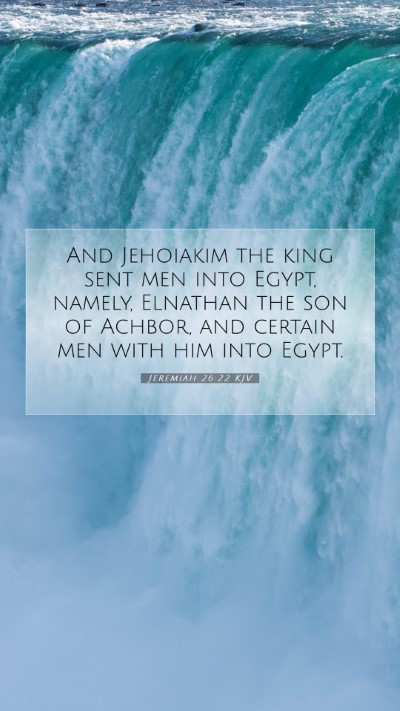Bible Verse Commentary: Jeremiah 26:22
Verse: "And Jehoiakim the king sent men to Egypt, to fetch the residue of the silver and the gold, which he had given to the Egyptians for his help: but he was not able to do it." (Jeremiah 26:22)
Understanding Jeremiah 26:22
Jeremiah 26:22 plays a significant role in illustrating the consequences of political alliances and the reliance on foreign powers during a time of crisis in Judah. This verse provides a glimpse into King Jehoiakim's attempts to secure his reign by seeking aid from Egypt, revealing deeper themes of faithlessness and foolishness in human judgment.
Bible Verse Meanings and Interpretations
-
Political Alliances: The verse highlights King Jehoiakim's reliance on Egypt, showcasing a common theme in the Old Testament where leaders sought assistance from foreign nations instead of trusting in God.
-
Faithlessness: Commentators like Matthew Henry emphasize that seeking help from Egypt indicates a lack of faith in God's provision and protection for Israel, leading to ruin instead of salvation.
-
Symbolism of Egypt: Egypt often symbolizes worldly power and enslavement in the biblical narrative. Jehoiakim’s ensnarement in political allegiances reflects the spiritual decline of Israel.
Bible Study Insights
In order to grasp the significance of this verse fully, it's crucial to consider the historical context of Judah during Jehoiakim's reign, marked by political instability and a departure from covenant faithfulness. The reliance on Egypt was not just political; it illustrated the larger spiritual malaise affecting the nation.
Commentary Highlights
-
Matthew Henry: He notes that this verse serves to illustrate human folly in seeking external help in times of distress while neglecting reliance on divine support, which leads to eventual despair.
-
Albert Barnes: Barnes elaborates on the futility of Jehoiakim's actions, indicating that his intentions, although aimed at retrieving wealth, were ultimately misguided as they defied God’s plan for Israel.
-
Adam Clarke: Clarke provides further analysis on the historical repercussions of Jehoiakim's decisions, reiterating how the pursuit of wealth and security leads to moral and spiritual degradation.
Applying the Verse to Daily Life
Jeremiah 26:22 serves as a poignant reminder for modern believers about the importance of putting faith in God rather than seeking assurance in worldly alliances or resources. This lesson connects to various aspects of faith practice:
- Faith over Fear: Trusting God's provision during times of need can transform one's perspective, turning potential despair into hope.
- Critical Evaluation of Choices: Believers are encouraged to assess whether their actions align with God's will or whether they are relying on their understanding.
- Community Support: This also applies to how we engage with community and assistance; true support comes when rooted in mutual faith rather than mere political gain.
Bible Cross References
- Isaiah 30:1-3: *“Woe to the rebellious children, saith the LORD, that take counsel, but not of me...”*
- 2 Kings 24:1-2: *“In his days Nebuchadnezzar king of Babylon came up, and Jehoiakim became his servant three years...”*
- Jeremiah 37:7: *“Thus saith the LORD, the God of Israel; Thus shall ye say to the king of Judah...”*
Conclusion
In summary, Jeremiah 26:22 encapsulates the struggles of faith and the consequences of turning away from divine guidance. By understanding the context, implications, and applications of this verse, believers can gain valuable insights that enhance their Bible study lessons and equip them towards a deeper understanding of Scripture.


